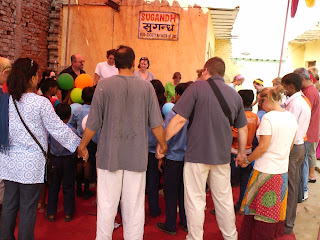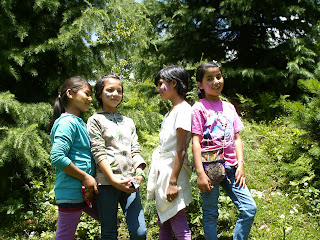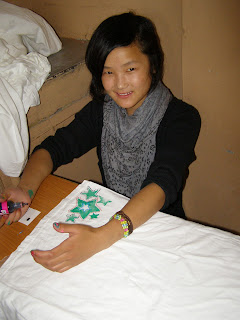Here are some images that were burned into my eyes, ears, tastebuds and nose:
I saw more garbage and flies than I knew existed.
I saw whole families on motorcycles. Once I saw dad in a helmet, two toddlers and a mom on the back. One of the toddlers was asleep and mom held him, so that he wouldn’t fall. This whole scene was taking place in three lanes of stop and go city traffic, flanked by autorickshaws, buses, tiny trucks, big trucks and bicycles.
I learned that what can’t be carried on a person’s back, is put on a bicycle (I saw someone riding a bike with at least 20 re-rods that are used to reinforce concrete). If the bike won’t handle it, then put it on a motorcycle. (I saw two men riding a motorcycle with a goat between them.) If that won’t work, jam it in/on an auto-rickshaw or a truck of the same size.
I learned that the roads and roadsides are a constant stream of chaotic humanity, yet, we only saw one accident.
It isn’t ok for women to show their legs or upper arms, but it is ok to show your belly when wearing a Sari.
Cows really are sacred, they are ignored and given free reign in all settings. I’ll never use the term, “Holy Cow” without realizing where it originated.
In the mountains marijuana grows everywhere, so the name ‘weed’ makes sense. I’m not sure that is why it was called that, but in the mountains, it is true.
I smelled jasmine and manure; curry/turmeric based body-odor; our guest house room had a teakwood floor that made the room smell wonderful; many indoor bathrooms had an outhouse smell. I smelled sandalwood incense and smoke from marijuana as I passed by a shop in downtown Manali.
I realized that the reason we were given a typhoid shot to go to India is because their rivers and streams have raw sewage in them. I saw a river that looked like it had ice on it, except that it was 102 degrees that day. It must have been a sudsy type of pollution. I saw people washing their clothes on the riverbank, downriver from the pollution. I wondered what else was in the river that I couldn't see.
I saw rice paddies, water buffalo, a cobra in a basket charmed with a flute, wild monkeys and camels ridden in New Delhi traffic.
I saw a man with his hands, feet, and nose taken by leprosy. He was sitting on the pavement in an alley in New Delhi. He wasn’t begging, he was just sitting.
As we shopped in a storefront bazaar, I was pursued by a little girl selling beads. She said to me, “Buy some my mother, I give you a good price, my mother.” I got 100 Rupees out of my bag and kept it in my hand. She said she would sell them to me, 20 strands for 100 Rupees. I said, ‘How many are in your hand?” She began to count them in English and miscounted, ending up at 20. I recounted them with her and she had 24. We exchanged a look when she realized her mistake. She said that she would give me a good price Rs 100 for 24. I bought them, but she continued to follow our group soliciting other team members. I said to her, “My friend isn’t going to buy any, but remember, I did. I asked her, “How old are you?” She told me she was 11. I asked if she goes to school. She said, no. I asked if the lady with the baby who was begging was her mother. She said no, her mom wasn’t there, and that she was very poor. I asked if she had any brothers or sisters. She said she had an older brother.
She also told me her mom made the beads that she was selling. (There were probably 10 other people selling identical bead strands. I wondered how much of what she had told me was a ‘sales ploy’ and I wondered what had happened to make this 11 year old so street-wise. I also wondered what her life would be like in the future.)
We saw children begging. Uma told us not to give them money. He said Slum Dog Millionaire was accurate. There are people who use the children as slaves to beg for them. He said if we feel a need to give, give food. The children would at least get some benefit from it.
I tasted amazing, wonderful, and spicy Indian food. I can’t begin to say the names of the dishes. I hope to learn to make some. I love the mint tea we were served at the Children’s Home. Masala Chai tea is also something I intend to make. I had watermelon juice and ice cream made from roses.
I found most of the people to be curious, helpful and gracious with their time and resources, no matter how limited their time and resources might be.
I haven’t really processed all of facets of this trip yet. I know God wanted me to be a part of this team. I think some of His reasoning was because I had some things to offer to people. I think some of His reasoning was for me to gain from people and experiences. I don’t really know the big picture yet, and it may take a long time to unfold for me.
I did have one experience that I am pondering. When I was in Manali, in the chapel and the children were singing, “How Great Is Our God” There was a sense of Holiness listening to the children’s voices and this thought popped into my head,
” This is why I brought you here.” I am prayerfully pondering its meaning. I do know my thought each time we sang with children in each setting, was an awareness of God's great love and Holiness in worshiping together that transcends culture and language differences.
************************
Here is a story and verse which have more meaning for me now that I have been to India.
It is adapted from “The Star Thrower by Loren Eiseley.
A man was walking along a deserted beach. As he walked, he could see a young boy in the distance, as he drew nearer he noticed that the boy kept bending down, picking something up and throwing it into the water. Time and again he kept hurling things into the ocean.
As the man approached even closer, he was able to see that the boy was picking up starfish that had been washed up on the beach and one-at-a-time he was throwing them back into the water.
The man asked the boy what he was doing, the boy replied, “I am throwing these washed up starfish back into the ocean. The sun is up and the tide is going out. If I don’t throw them in, they’ll die.”
“But,” said the man, “you can’t possibly save them all. There are thousands on this beach, and this must be happening on hundreds of beaches along the coast day after day.
“You can’t possibly make a difference.”
The boy smiled, bent down and picked up another starfish, and as he threw it back into the sea, he replied, “Made a difference to that one.”
My prayer daily is to love people as God loves them. To move my heart in the direction of His, means loving people one-at-a-time. Helping them meet their needs is showing them love and respect. Hopefully, God’s love will flow vertically down through me and out of my mouth, hands and feet to the people He loves.
Matthew 25:44-45
The Message (MSG)
44". . . Master, what are you talking about? When did we ever see you hungry or thirsty or homeless or shivering or sick or in prison and didn't help?”
45"He will answer them, 'I'm telling the solemn truth: Whenever you failed to do one of these things to someone who was being overlooked or ignored, that was me—you failed to do it to me.
*************
It is my hope and prayer that this blog entertained you, opened new aspects about India for you, and maybe gave you some new insights to aid you in your relationship with God.
My thanks to Anna Van Wyck and John Balyo for the use of their photos.
























































